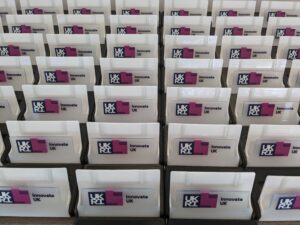


On 7 March the University of Hull celebrated 10 years of KTP, sharing their partnerships, projects and impacts. Representatives from businesses, academics and KTP Associates showcased some of the fabulous work and breakthroughs that KTP projects have enabled them to achieve.
What is a Knowledge Transfer Partnership?
The Knowledge Transfer Partnership (KTP) programme has been helping UK businesses to innovate and grow for over 47 years – it is the oldest government funded R,D&I programme. It works by linking companies with a research organisation that has state-of-the-art skills, know-how and technical expertise that can be adopted for commercial and societal benefit. A graduate is recruited to embed new skills and the latest academic thinking into the business setting; this three-way partnership delivers a specific, strategic innovation project, increasing capability and capacity within the company for advantage, while upskilling all partners.
The academic or research organisation partner will help to recruit a suitable graduate, known as an Associate. They will act as the employer of the graduate, who then works at the company for the duration.
The scheme can last between 12 and 36 months, depending on what the project is and the needs of the business. Each KTP is a 3-way partnership between:
- A UK-based business of any size or a not-for-profit organisation
- An academic or research organisation. This could be a university, college or research and technology organisation in the UK
- A suitably-qualified graduate, with the capability to lead a strategic business project
The University of Hull has been involved with many KTPs which have delivered huge competitive advantage to the business we’ve partnered with, from increased turnover to the ability to enter new markets. Over two-thirds of our graduate Associates have been offered permanent positions with the company at the end of the KTP.
We’re currently working with a number of KTP partners. If you couldn’t make our event, you can see the KTP slides.
See some examples of how KTPs have benefitted businesses:
As part of the KTP celebration event, the Aura Innovation Centre was given a challenge – produce a thought-provoking takeaway item for the event that was sustainable, and that showcased innovation. The AIC designed a business card holder which featured some of the ways in which KTPs can help a business: through material innovation and process innovation.
The material innovation came through using a algae-based PLA plastic. Not only are PLA products more sustainable than oil-based plastics, but they also address ecological issues, as the algae is collected from natural environments, such as lakes, where toxic algal blooms can occur, damaging the ecosystem and harming aquatic life.
Process innovation came through using innovative PolyJet technology to print the items. PolyJet printing uses inkjet printing processes to print 3D items. It allows the full colour spectrum to be printed, and also allows multiple materials to be printed with in one print process. It can print to a high resolution, allowing fine details to be printed. In this case, the printing was done by Xtrude, a local SME founded by two University of Hull graduates.

Who do I reach out to for..?
-
- Faculty of Science and Engineering – Dr Trevor Gregory, Head of Business Engagement and Enterprise T.Gregory@hull.ac.uk
- Faculty of Health and Medical Sciences – Fay Treloar, Faculty Director of Business Engagement and Enterprise F.Treloar@hull.ac.uk
- Faculty of Business, Law and Politics – Richard Keegan, Director of Business Engagement and Enterprise R.Keegan@hull.ac.uk
- Faculty of Arts, Cultures and Education – Dr Catherine Wynne, Associate Director Research C.Wynne@hull.ac.uk
- KTP KTP-Enquiries@hull.ac.uk
- Knowledge Exchange more broadly KE@hull.ac.uk
